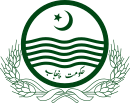Abdur Rab Nishtar
Abdur Rab Nishtar سردار عبد الرب نښتر | |
|---|---|
| 2nd Governor of West Punjab | |
| In office 2 August 1949 – 24 November 1951 | |
| Monarch | George VI |
| Governors‑General | Khawaja Nazimuddin Malik Ghulam Muhammad |
| Preceded by | Francis Mudie |
| Succeeded by | Ibrahim Ismail Chundrigar |
| Personal details | |
| Born | Abdur Rab Nishtar 13 June 1899 Peshawar, British India |
| Died | 14 February 1958 (aged 58) Karachi, West Pakistan |
| Resting place | majority2 |
| Nationality | Pakistani people |
| Political party | Pakistan Muslim League |
| Parent |
|
| Alma mater | Aligarh Muslim University The University of the Punjab |
| Profession | Politician |
This article needs additional citations for verification. (April 2016) |
Sardar Abdur Rab Nishtar (13 June 1899 – 14 February 1958; Template:Lang-ps) was a Muslim League stalwart, a Pakistan movement activist and later on a Pakistani politician.[1]
Education
Nishtar's ancestors belonged to a prominent Kakar Pashtun family originally of Zhob and settled in Peshawar, British India. He completed his early education in a Christian mission school and later Sanathan Dharam High School in Bombay, (now 'Mumbai' in India). He eventually graduated from the Edwardes College in Peshawar [2] and then later on completed his Bachelor of Arts degree from the Punjab University, Lahore. He later went to Aligarh and received an LL.B degree with honours from Aligarh Muslim University in 1925.
Political career
A man of deep religious convictions, he also had a deep interest in Islamic mysticism, a fact which probably reflects the influence of his associate Maulana Ali. Sardar Abdur Rab Nishtar remained member of Indian National Congress 1927–31, was elected Municipal Commissioner, Peshawar Municipal committee, successively from 1929 to 1938, joined All-India Muslim League, became a confidante of Pakistan's founder Muhammad Ali Jinnah. From 1932 to 1936, Nishtar was a member of All India Muslim League (AIML) Council, member NWFP (Northwest Frontier Province) legislative Assembly 1937 to 1945, Finance Minister NWFP 1943–45, member AIML Working Committee, 1944–47, represented the All India Muslim League at the Simla Conference in 1945.[3]
Abdur Rab Nishtar was ousted from provincial politics through the political maneuvers of a rival political leader Abdul Qayyum Khan in 1946.[4] The last named was an outcaste from the Indian National Congress Party, who then vigorously opposed that political party after his ouster from it,[5] especially he was against the Union of India and was working for creation of an independent Dominion of Pakistan.[6]
As Federal Minister
After Pakistan was created, Nishtar was appointed Minister for communication in Pakistan. After the dismissal of the Punjab Provincial government in 1949, Sardar Nishtar was appointed Governor of Punjab (the first Pakistani governor in Pakistan's history, till that time the British government had still continued governing with previous English Governors). He effectively ran the Governorship for two years paving the way for restoration of an elected government in 1951.
Nomination for Prime Minister
Nishtar was considered a serious contender for the post of Prime Minister after Liaqat Ali Khan's assassination. His appointment was blocked by senior secularists and liberal officials including the future President Iskander Mirza because of Nishtar's conservative and Islamic views.
Became Opposition Leader against corrupt politicians
He subsequently fell out with the government over the dismissal of Khawaja Nazimuddin's government by Governor General Ghulam Muhammad. Refusing to be involved in what he perceived as an undemocratic act Nishtar went into opposition. In 1956, when the first constitution was adopted, Sardar Abdur Rab Nishtar was elected president of the party against the wishes of President Iskandar Mirza and then prime minister Chaudhry Mohammad Ali who were backing Dr. Khan Sahib as West Pakistan chief minister while Nishtar wanted a Muslim League man for the office. But a big majority of the League leaders, including Nawab Mushtaq Ahmad Gurmani and Mumtaz Daultana, supported Iskander Mirza.
Leader of Muslim League
He subsequently took over the leadership of the Muslim League party and the League was expected to do well in West Pakistan in the planned 1959 elections but unfortunately he died before that.
Death
Abdur Rab Nishtar died on 14 February 1958 in Karachi. Nishtar Medical College and Nishtar Hospital in the city of Multan are named in his honor. Nishtar Park and Nishtar Road in Karachi are named after him. He was buried at Mazar-e-Quaid near the Tomb of Muhammad Ali Jinnah, the founding father of Pakistan to acknowledge his services in the cause of Pakistan.
References
- ^ http://storyofpakistan.com/sardar-abdur-rub-nishtar, Abdur Rab Nishtar Biography, storyofpakistan.com website, Retrieved 5 Jan 2016
- ^ http://www.khyberpakhtunkhwa.gov.pk/aboutus/People-Tribles.php, Khyber Pakhtunkhwa official government website, Retrieved 5 Jan 2016
- ^ http://www.cybercity-online.net/pof/sardar_abdur_rab_nishtar.html, Abdur Rab Nishtar profile, Pioneers of Freedom website, Retrieved 5 Jan 2016
- ^ The Leader at Pakistan.gov.pk
- ^ Robert Aura Smith, Divided India (Read Books, 2007), pp. 241–242
- ^ Rajmohan Gandhi, Patel: a Life, p. 416
Bibliography
Syed Mujawar Hussain Shah, Sardar Abdur Rab Nishtar: A Political Biography (Lahore, Qadiria Books, 1985).
External links
- Sardar Abdur Rab Nishtar, Abdur Rab Nishtar, Pioneers of Freedom website, Retrieved 5 Jan 2016
- OPF page, Overseas Pakistanis Foundation website, Retrieved 5 Jan 2016
- 1958 deaths
- 1899 births
- First Pakistani Cabinet
- All India Muslim League members
- Pashtun people
- Governors of Punjab, Pakistan
- Aligarh Muslim University alumni
- Leaders of the Pakistan Movement
- Khyber Pakhtunkhwa politicians
- Pakistani politicians
- People from Peshawar
- Communications Ministers of Pakistan
- Pakistani sports executives and administrators




